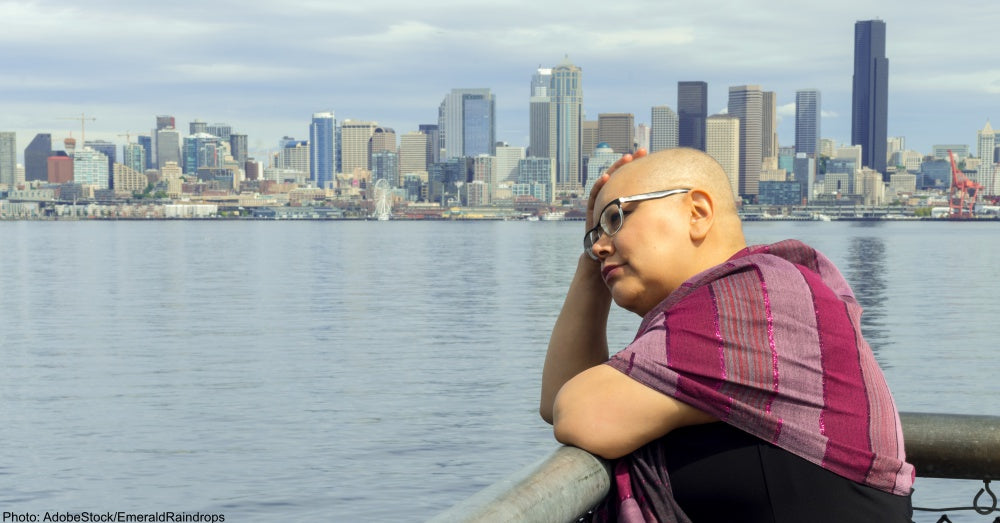10 Ways to Fight Fatigue from Cancer Treatment
Katie Taylor
There's tired... and then there's cancer-tired. Even if you have the most chipper, most can-do attitude in the world and are sucking down a giant iced latte, cancer can still drain the pep from your step and leave you completed deflated.
It's normal to feel tired, even tired all the way down to your bones. Treatment, and the whole cancer experience, is tiring. Here are a few of the reasons why:
- The actual cancer. Some cancers release fatigue-causing proteins, some weaken muscles or organs, and some alter hormones. All these things can affect energy levels, which means that cancer can be tiring before you even begin treatment.
- Cancer treatment. Chemotherapy and radiation therapy can destroy healthy cells and therefore zap energy. The side effects of these therapies, as well as some cancer medications, can also cause fatigue. It's tiring just thinking about it.
- Anemia. Your red blood cells can be reduced by cancer treatment, which means you'll have fewer oxygen-carrying cells and less energy. Anemia happens to about 50 percent of cancer patients at some point during their treatment. (More on cancer and anemia here).
- Emotional exhaustion. Even if you are lucky enough to have a great support team, explaining your cancer, driving to treatment, and the daunting task of thinking about your own mortality are draining. It may take all your mental focus just to get out of bed in the morning.
- Changes in diet. Perhaps you can no longer eat the nutritious foods you once enjoyed, and crackers are all you can stomach. The lack of nutrition or poor nutrition forced upon you by cancer can take its toll on your energy stores.
 Photo: AdobeStock/Photographee.eu
Photo: AdobeStock/Photographee.eu
It's normal to be tired, but that doesn't mean we want to feel that way. Here are 10 strategies for scrimping, saving, and maximizing the energy you do have:
 Photo: AdobeStock/Ozgur Coskun
Photo: AdobeStock/Ozgur Coskun
1. Try to get enough calories
There are barriers to eating a full three-course meal when you're going through treatment. Nausea, diarrhea, and changed tastes are just a few. But your body needs fuel to fight cancer, and you should talk to your medical team about how many calories you should aim for each day and what foods you should be eating. You may find you can only tolerate certain foods. If so, go ahead and eat only those foods. Treatment time is not the time to start a diet, because the main thing is that you get enough.
Focus on eating small meals throughout the day, and if there's a time when you have more energy or appetite, schedule meals then. Ask friends to bring you meals or to join you for meals so that eating doesn't require a lot of work and is something to look forward to. Try to include protein, and be sure to stay hydrated too!
 Photo: AdobeStock/sonyakamoz
Photo: AdobeStock/sonyakamoz
2. Just Say No To Stress
This is easier said than done, but when you're fighting cancer, you have to give yourself permission to use all your extra mental and emotional capacity to fight the cancer that's trying to take over your body—you can't waste precious emotional resources thinking about if your house is clean or if you sent a birthday card to your uncle. It's time to massively let things go.
Not even the strongest of us has an unlimited store of emotional resources, so if you spend time and energy worry on something unimportant (like whether or not your socks match) then you will have less energy for things that really matter, like staying positive or catching up with friends.
Be stingy about how you spend your mental and emotional resources so that you have enough leftover to take care of yourself. Keep to-do lists small so that you can feel accomplished when you finish one or two things, and make sure that people know that they should adjust expectations until treatment is over.
 Photo: AdobeStock/pathdoc
Photo: AdobeStock/pathdoc
3. ASK about supplementation
There's no shortage of advice on how to fix your fatigue, and pills, oils, powders, and extracts are readily suggested, with anecdotal evidence, as surefire ways to boost your energy. But remember that supplement companies aren't required to prove that their products are safe, and there's a lot of misinformation about what supplements should be used for.
Taking some supplements may indeed help you to feel better, but they may also cause complications during treatment. Some supplements can cause skin reactions, and some may interfere with cancer treatment. Please, talk to your medical care team before deciding to use supplements so you can make a well-informed, safe decision.
 Photo: AdobeStock/Monticello
Photo: AdobeStock/Monticello
4. Find an outlet
Find a way to relax so that you can unplug and unwind. You may want to try meditation, relaxation, or deep breathing exercises. Or something more classic: knitting, reading, or just watching your favorite TV show may be excellent ways to relax mentally and emotionally. Perhaps you never let yourself watch more than one episode of Property Brothers at a time. Treatment is the perfect time to pull out all the stops and make your R&R time priority number one—keep those episodes coming!
You may want a way to actively express the emotions your dealing with, and if that's the case then a form of artistic expression can be helpful. Try journaling, painting, writing poems, or whatever makes it easy for you to give voice to your emotions.
 Photo: pixabay/LuciGood
Photo: pixabay/LuciGood
5. Love Sleep
The American Cancer Society recommends planning your day with short naps or rests of about 30 minutes each and sleeping for about 7 to 8 hours a night. Too much rest can actually drain your energy, and too many naps during the day can compromise your sleep at night. So get in lots of rest, but aim for a balance. For the best night's rest, avoid caffeine for 8 hours before bedtime.
 Photo: AdobeStock/Focus Focus LTD
Photo: AdobeStock/Focus Focus LTD
6. Exercise
Sounds counterintuitive, doesn't it? But moderate exercise is actually great for reducing fatigue, and it can help you sleep better.
Talk to your doctor about any contraindications, and try to work in regular exercise that you can enjoy without overstraining yourself. If you can get outside for short walks then you can help clear your head while you get moving. Bonus!
 Photo: AdobeStock/Kzenon
Photo: AdobeStock/Kzenon
7. Address Anemia
Cancer treatment can cause low red blood cell count, or anemia. The main sign of anemia is fatigue, but it may also cause weakness, irregular heartbeat, chest pain, shortness of breath, dizziness, difficulty concentrating, and difficulty staying warm.
First, talk to your doctor as they may be able to address some of the causes of your anemia. You can also try eating more foods with iron and folic acid such as enriched breads and cereals, asparagus, beans, red meat, or almonds.
 Photo: pixabay/qimono
Photo: pixabay/qimono
8. Ask About medication
Hopefully you have a cancer care team that's asking about your side effects and is well-informed about what you are feeling, but that doesn't mean you shouldn't self-advocate too. When you talk about your fatigue with medical staff, be sure to be as clear as possible. Describe how your fatigue affects your daily life and what you're not able to do. There are some medications that may be able to help if appropriate.
If you're not able to get out of bed for 24 hours or more, are feeling confused or dizzy, or can't catch your breath, be sure to report these symptoms to your doctor right away.
 Photo: AdobeStock/Halfpoint
Photo: AdobeStock/Halfpoint9. Accept (and ask for) help
You may be bombarded with requests to "let me know if there's anything I can do" when you're going through treatment. When are you ever going to get another offer like that? It can make you and your friends feel better if you actually accept help.
The problem is it's hard to know what people can do, and all the offers can be overwhelming. Try keeping a notebook so you can make notes every time you think of something you could use help with. You could also choose a close friend to be your personal "volunteer coordinator" and assign jobs like grocery shopping and house cleaning. Don't be embarrassed to ask for favors large and small!
This is definitely another one of those easier-said-than-done things, but having others help you cope emotionally and logistically. You would probably do the same for your friends, so let them help you!
 Photo: AdobeStock/ashtproductions
Photo: AdobeStock/ashtproductions
10. Be kind to yourself
While you might be perfectly willing to tell other people that they need to relax, it can be hard to give yourself permission to do so. We are so programmed to perform, to deliver, and to juggle a million things at once that we can feel like failures if we have to pull back and relax. But make phrases like these part of your go-to vocabulary:
- "Oh well."
- "One step at a time."
- "There's always tomorrow."
- "I'd rather focus on enjoying life right now than worrying about _________."
- "No big deal."
- "I fed the kids pizza every night this week... I totally didn't let anyone starve!"
- "I would extend grace to another person in my situation, so I'm going to extend it to myself."
- "This is only a phase."
- "No one ever died because they sat on the couch watching cat videos for 5 hours."
 Photo: AdobeStock/Rawpixel.com
Photo: AdobeStock/Rawpixel.com
Cancer treatment is a part of your life, and it doesn't have to follow the same rules as the rest of your life. Take care of the things you absolutely care about most, and let the rest go. Treat yourself as you would a dear friend, and remember that there are so many people rooting for you!
Keep fighting, friends!


